In this article:
High blood pressure, or hypertension, is a common debilitating condition experienced by a majority of the population around the world.
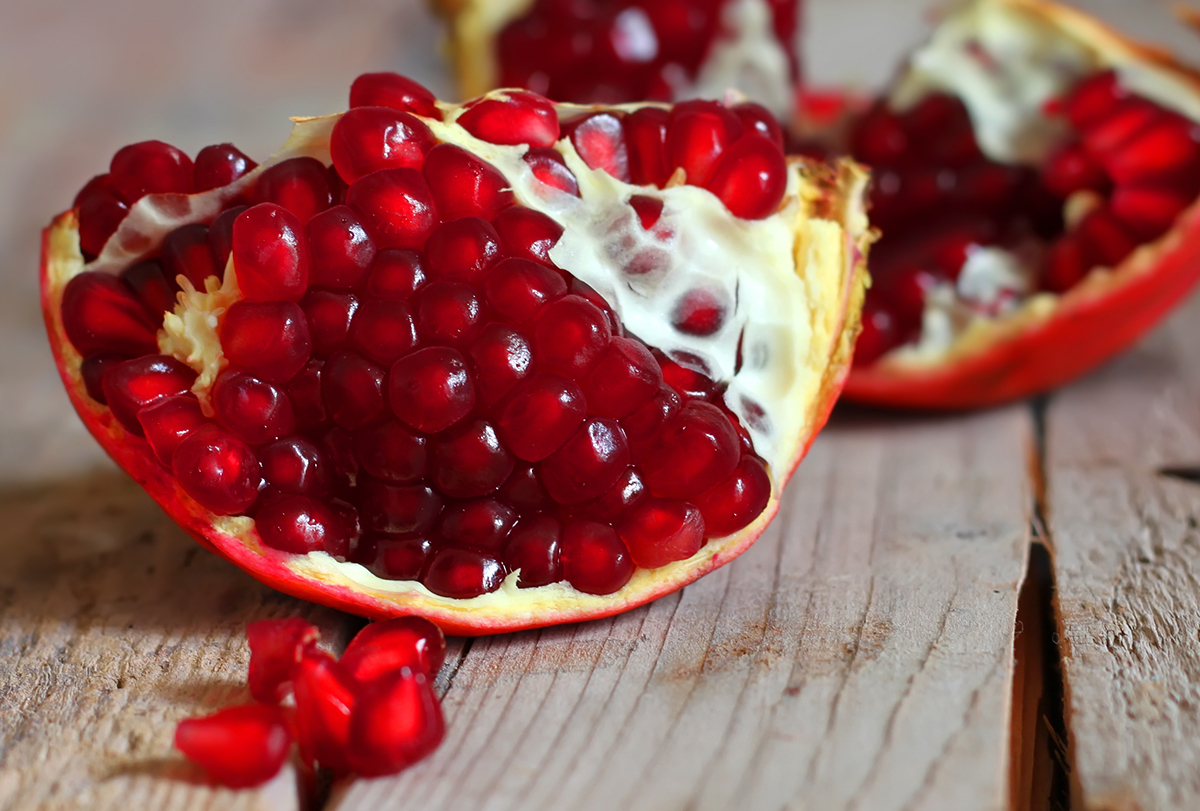
Age, gender, lifestyle, and heredity are contributing factors to the development of hypertension. Alcohol abuse, an unhealthy diet, and high levels of stress can also be causes of high blood pressure. (1)
High blood pressure occurs when the blood exerts increased pressure against the walls of the blood vessels. Clinically, you are determined to have hypertension if your blood pressure is over 140/90 mmHg or less than 130/80 mmHg in those with kidney disease or diabetes. (1)
Treatment of hypertension includes management through medication or lifestyle modifications including limiting foods that contribute to the rise in blood pressure.
The National Heart, Lung, and Blood Institute recommends the DASH diet for the management of hypertension. The DASH diet is based on the following guidelines: (2)
- Consume 2,000 calories each day.
- Include more servings of fruits and vegetables, lean meats and poultry, nonfat dairy products, and nuts.
- Avoid consuming tropical oils such as palm kernel oil, palm oil, and coconut oil.
- Limit sodium through salt, and ensure the diet is rich in fiber, potassium, magnesium, calcium, and protein.
Foods That Lower Blood Pressure
In addition to the guidelines recommended by doctors and experts, some foods can be included in your daily diet to help in the management of high blood pressure.
1. Pomegranate
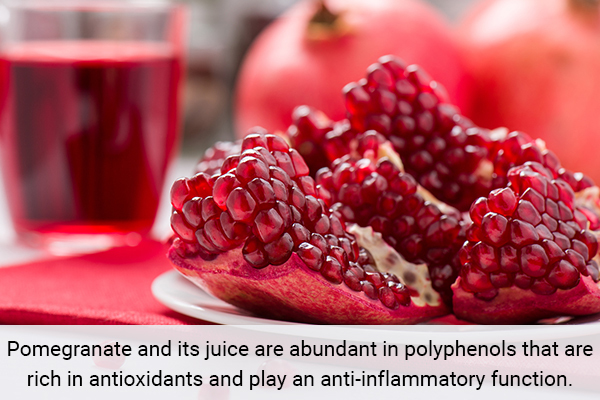
Pomegranate and its juice are abundant in polyphenols that are rich in antioxidants and play an anti-inflammatory function. The bioactive compounds in the fruit have been known to have a beneficial effect on the heart. (1)
In people with diabetes, pomegranate inhibits the angiotensin-converting enzyme and lowers blood pressure. In animal studies, daily consumption of pomegranate juice improved main arterial blood pressure and reversed the changes brought about by diabetes. (1)
In studies done on men between the ages of 39 and 68, daily consumption of 150 ml of pomegranate juice reduced systolic and diastolic blood pressure by 7% and 6%, respectively. (1)
Consumption of half a glass of pomegranate juice (150 ml) can therefore be an effective strategy in the management of blood pressure.
2. Citrus fruits
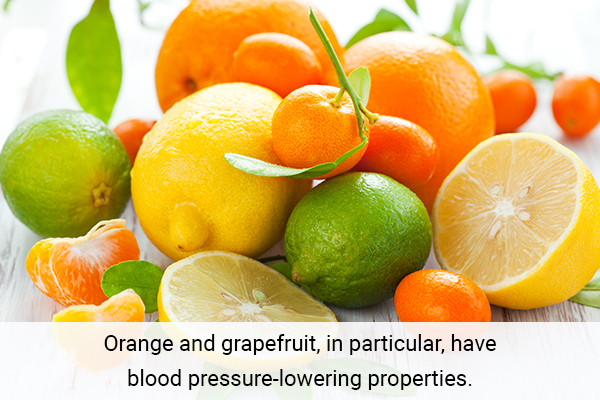
Orange, lemon, limes, and grapefruit are delicious to consume and offer many health benefits.
Orange and grapefruit, in particular, have blood pressure-lowering properties. Grapefruit is replete with vitamin C, pectin, and fiber, and its juice can reduce blood pressure in people suffering from hypertension. (1)
In one study, drinking citrus juice reduced both systolic and diastolic blood pressure by about 5% in patients between the ages of 18 and 59. (1)
Including citrus fruits in the daily diet can therefore offer protection from hypertension.
3. Celery
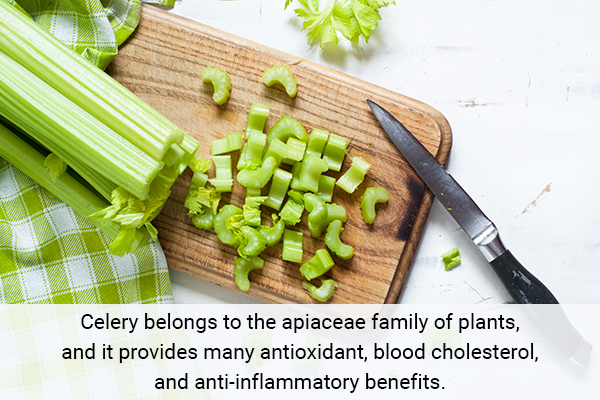
Celery belongs to the Apiaceae family of plants, and it provides many antioxidant, blood cholesterol, and anti-inflammatory benefits. It was also used in folk medicine to lower blood pressure. (3)
Studies have shown that celery seeds reduced blood pressure and improved the heart rate in rats. The blood pressure-lowering ability of celery persisted even after stopping the treatment. (3)
Therefore, celery seeds and stems can be included in the daily diet in the form of juice and by using them as ingredients in dishes, salads, and soups.
4. Tomato
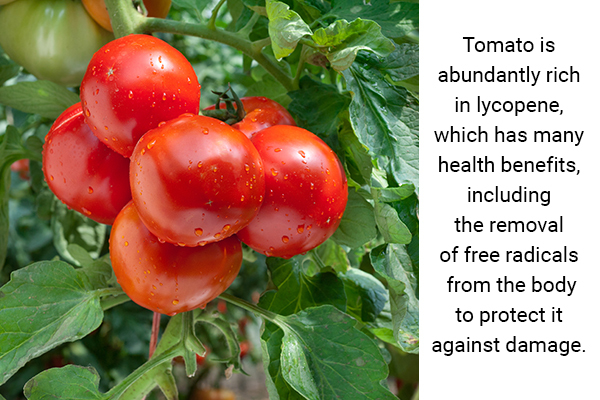
Tomato is abundantly rich in lycopene, which has many health benefits, including the removal of free radicals from the body to protect it against damage.
Tomato nutrient complex – which consists of more than just lycopene and is found in whole tomatoes – was found to have a blood pressure-lowering effect in people with mild to moderate hypertension. (4)
Since 100–200 g of tomatoes contains only 4–8 mg of lycopene, which is not sufficient to exhibit blood pressure-lowering effects, the addition of supplements is recommended. (4)
Do remember to consult your doctor before consuming lycopene or any other supplement.
5. Dairy products
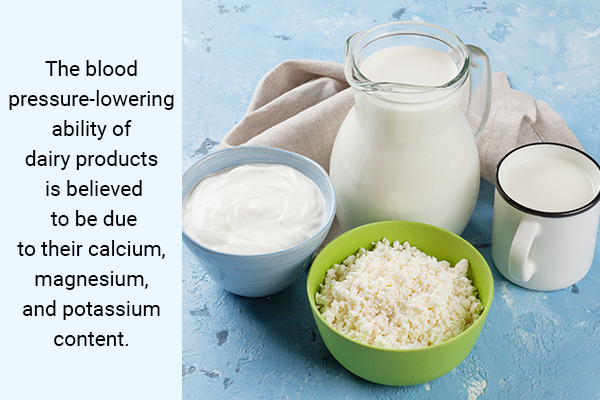
Nonfat dairy products such as yogurt, low-fat cheese, and milk are recommended as part of the DASH diet.
The blood pressure-lowering ability of dairy products is believed to be due to their calcium, magnesium, and potassium content. Moreover, a bioactive protein in dairy called lactotripeptide has blood pressure-lowering effects. (1)
Studies done on adult men have shown dairy consumption to lower systolic blood pressure by about 2 mmHg. However, the same effect was not observed in women. (1)
6. Omega-3 fatty acids
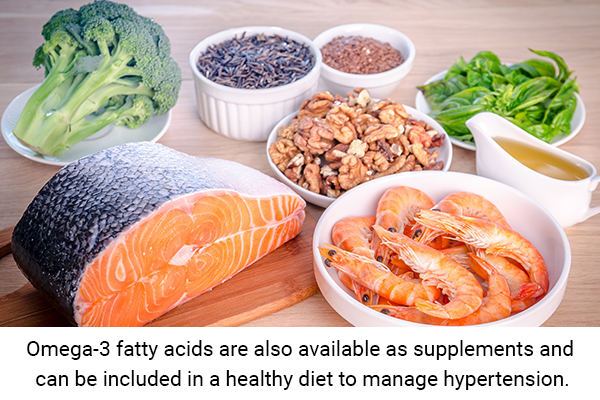
Fatty fish such as salmon, herring, and haddock contain omega-3 fatty acids and are good for heart health.
Components of omega-3 such as eicosapentaenoic acid (EPA) and docosahexaenoic acid (DHA) are found in fish and fish oil, whereas alpha-linolenic acid (ALA) is found in nuts such as walnut and flaxseed. (1)
Omega-3 fatty acids reduce inflammation and substances that can exert pressure against the walls of the blood vessels.
In the INTERMAP study on adults from China, Japan, the United Kingdom, and the United States, consumption of omega-3 fatty acids from both fish and vegetarian sources reduced blood pressure effectively. (1)
Omega-3 fatty acids are also available as supplements and can be included in a healthy diet to manage hypertension. Do consult your doctor before consuming any supplements.
7. Garlic
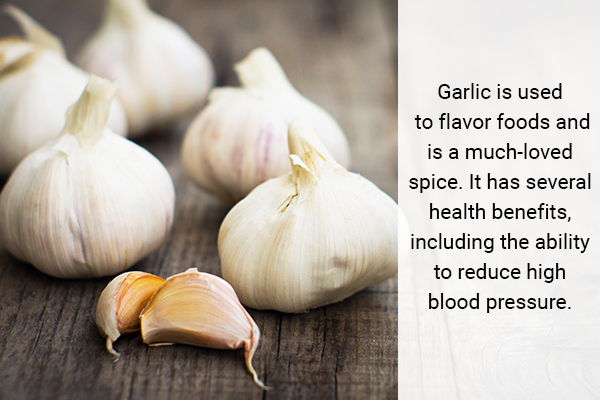
Garlic is used to flavor foods and is a much-loved spice. But it also has several health benefits, including the ability to reduce high blood pressure. (1) Garlic’s main bioactive sulfur compound, allicin, has the ability to relax the blood vessels, easing the flow of blood through them.
Different forms of garlic including powders, oils, and extract have been found to reduce both systolic and diastolic blood pressure by 8 and 7 mmHg, respectively. (1)
Using garlic powder as a salt substitute can go a long way in improving the palatability of food while also effectively reducing blood pressure.
8. Pistachios
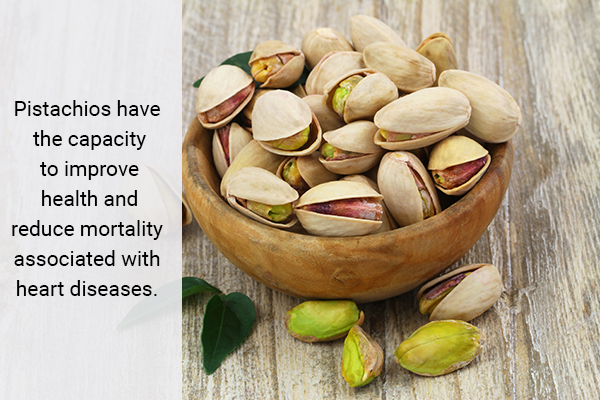
Nuts, in general, have the capacity to improve health and reduce mortality associated with heart diseases. (5)
In short-term studies, pistachios have been found to reduce levels of cholesterol, both total and LDL. (5) In human studies, a diet that included 1 serving of pistachios was able to effectively reduce high blood pressure. (5)
The ability of nuts to relax blood vessels and reduce constriction was found to be the contributing factor to lower blood pressure in people who ate nuts regularly.
9. Pumpkin seeds
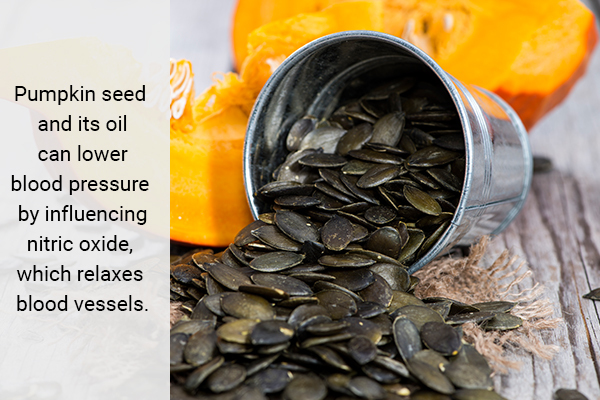
Pumpkins are a versatile vegetable used in both savory and sweet preparations in countries such as India, Pakistan, China, Argentina, America, and Brazil.
Pumpkins have a rich nutrient profile; they are full of vitamins, minerals, antioxidants, phytoestrogens, carotenoids, and other phenolic compounds. (6) Pumpkin seed and its oil can lower blood pressure by influencing nitric oxide, which relaxes blood vessels.
In animal studies, rats fed with pumpkin seed oil had lowered blood pressure and improved heart rate. (6) It is important to note that these results were also partly due to amlodipine, a blood pressure medication, since the rats were also given medication along with pumpkin seed oil.
10. Green tea
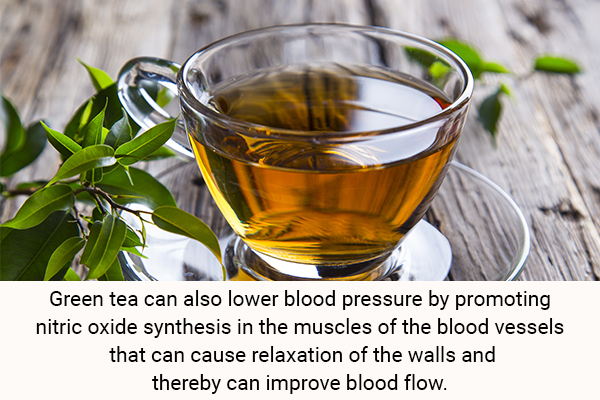
Green tea is rich in polyphenols, catechins, and flavonoids. It can also lower blood pressure by promoting nitric oxide synthesis in the muscles of the blood vessels that can cause relaxation of the walls and thereby can improve blood flow. (1)
In one study, long-term consumption of green tea lowered blood pressure in Chinese adults. The result was not as effective in obese individuals and smokers. (1)
11. Dark chocolate
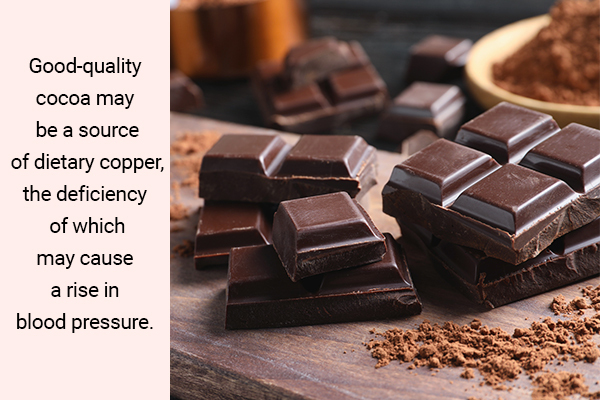
Good news for chocolate lovers! Chocolate may help in reducing blood pressure.
Good-quality cocoa may be a source of dietary copper, the deficiency of which may cause a rise in blood pressure. In addition, they are also rich in potassium, which balances out sodium and reduces blood pressure. (7)
In one study, higher dark chocolate consumption (more than 4 bars each week) was associated with a significant decrease in blood pressure. (8) However, it is important to remember to choose the dark variety to reduce the intake of added sugars.
Most-Asked Questions
Can I use these remedies to treat a sudden rise in blood pressure?
Sudden spikes in blood pressure can be due to several reasons, and since natural remedies can take some time to show results, it is better to consult a doctor and consume the prescribed medication to avoid complications.
Can I consume supplements of each of the blood pressure-lowering food?
Supplements can be a great way to consume nutrients that are otherwise not eaten via the diet. Consult your doctor to identify the best supplements for you, but in the meantime, do not hesitate to add these natural foods to your daily diet.
Final Word
High blood pressure has become a common cause of concern for many people. Unchecked and untreated high blood pressure over a long period can lead to complications that can be life-threatening.
Including foods that can help with the management of blood pressure in the diet is a safe and effective way to manage blood pressure in a healthy manner.
Overall dietary modification plays a key role in not only keeping the blood pressure within the recommended limits but also preventing the development of further complications of the heart.
- Was this article helpful?
- YES, THANKS!NOT REALLY


